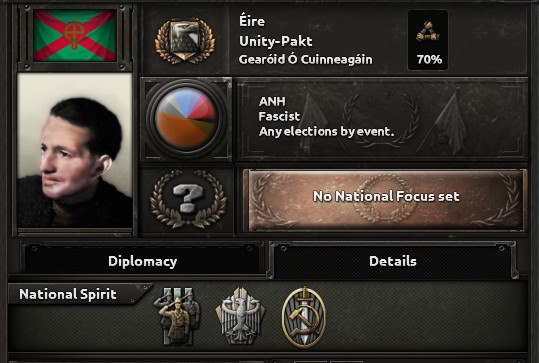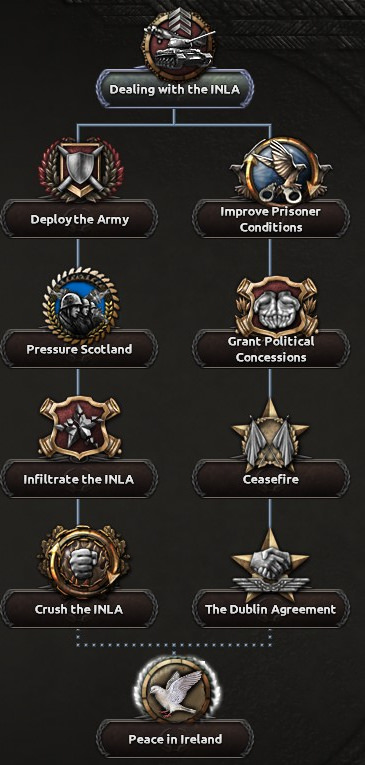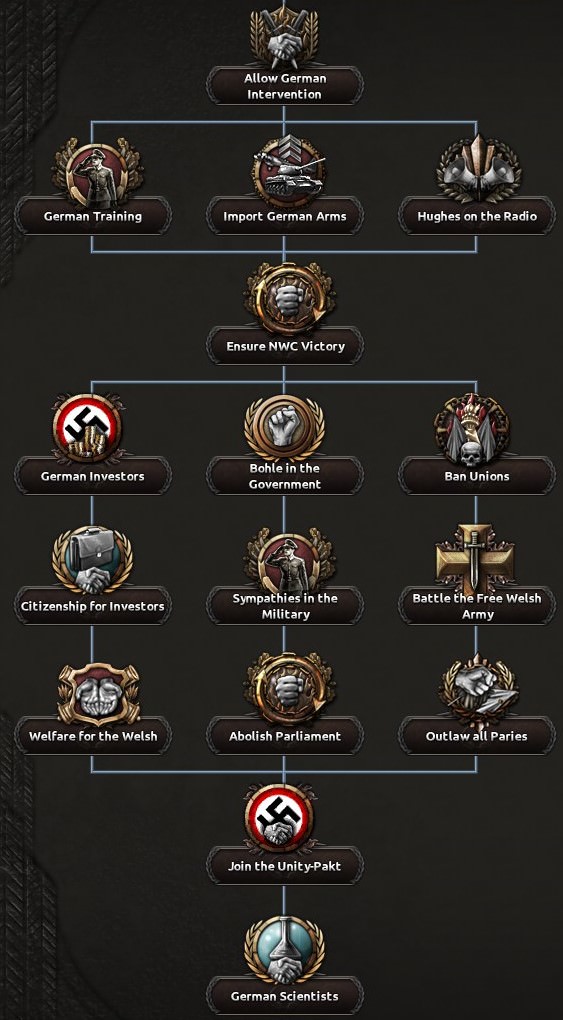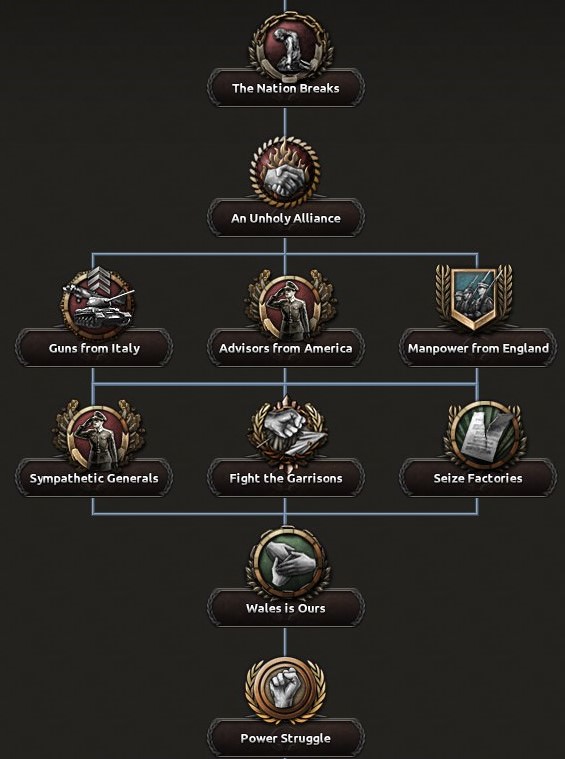Dev Diary V: Back to Britain
Hello and welcome to a delayed diary where we return to the British isles! We’ve received many questions about whether or not the other nations will also receive content and focus trees. We plan for every nation in TNO to be unique, so yes, they will all receive unique trees and flavor, eventually at least.
We have a dev for every nation in the British Isles, including Cornwall, and we’ll be showing you all of them today!
First off we have Ireland, being developed by Ahearne, who you may recognize as the Ireland dev from Kaiserreich.
Ireland:
Hello, I’m Ahearne, today I will be discussing Ireland in the The New Order.
Ireland, despite fending off a British invasion in 1943 to seize the Treaty Ports due to German intervention and retaking Northern Ireland, fell to fascist revolution in 1948 due to the combination of Éamon de Valera’s growing unpopularity, economic damage caused by the war, and the Unionist insurgency following reunification. The nail in Irish democracy’s coffin was when de Valera attempted to return to isolationism, prompting a German-backed revolution lead by the IRA and the Irish fascist party Ailtirí na hAiséirghe.
Under Ó Cuinneagáin, the main priorities became the restoration of the Irish language (incorporating modern language teaching techniques and full state promotion over the lip-service paid to the language previously, as well as stigmatization and restrictions against the English language), restricting emigration, transitioning the economy to corporatism and waging a ruthless ethnic cleansing campaign in Ulster, sending many Unionists in refuge in Scotland.
Ireland in 1962 remains a fascist dictatorship ruled by the Comhairle Náisiúnta, the Irish equivalent of Italy’s Grand Council of Fascism, and it’s Ceannaire, Gearóid Ó Cuinneagáin, while the IRA, once a rebel group until the 1948 Revolution, has become the national army of Ireland. Despite the upheavals of the early years, fascism has become stable and entrenched despite some continued insurgency from the socialist INLA, backed by the communist Connolly Association in Scotland, however Hitler’s assassination and the resulting change in the world order may change that.
The Irish Republican Army is large for Ireland’s size with mandatory three-year-conscription justified by the INLA guerrilla campaign, despite growing discontent among the people at the long conscription times, as well as the economic drawbacks of maintaining the army and conscripting many young potential workers. In the centre path the Irish government can either choose to maintain the army, embracing a Prussian-style 'Army with a State' approach to defend and fight for Ireland, or downsize the army and begin focusing on an approach involving guerrilla warfare and quality over quantity. The other army focuses involve modernising the Irish army and establishing fortifications to protect Ireland in the case of a defensive war.
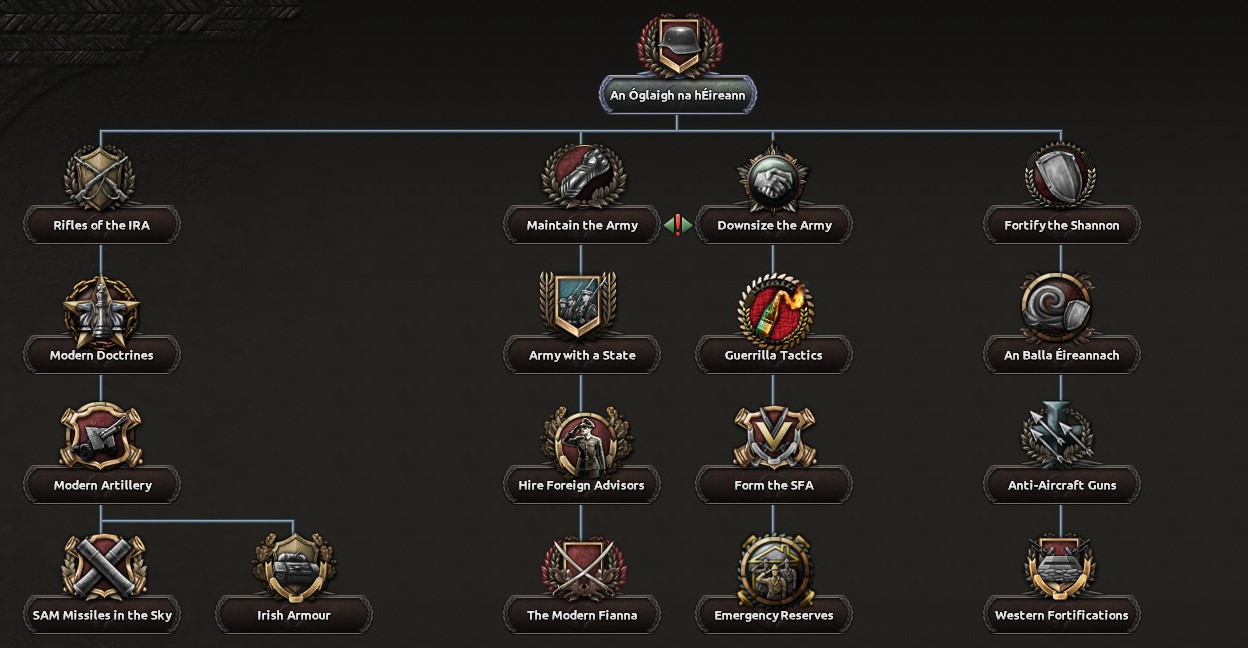
Due to the costs of the army and Ó Cuinneagáin's policies, the Irish Navy and Air Force, whilst bigger than it was in the 1930s and 40s, it remains small even compared to some nations of its size, and the trees mainly involve updating naval and air technology.

Economically, while Corporatism has helped the Irish economy to develop despite the war in Ulster during the late 40s and early 50s that left it depopulated as many Unionists were killed or fled to Scotland as well as the cost of maintaining the army, it is clear that there is much room to be improved if Ireland is to be an economically successful country, such as redeveloping the industry of Ulster and encouraging migrants fleeing repressive regimes in Europe to settle and repopulate Ulster, as well as expanding the ports of Ireland to serve as a bridge for trade between North America and Europe. Other measures including improving Irish resources such as steelmaking, zinc mining and exploring the Rockall Basin for gas and oil resources (the Irish government having claimed Rockall as theirs), as well as improving the Irish educational system to encourage technological advances.
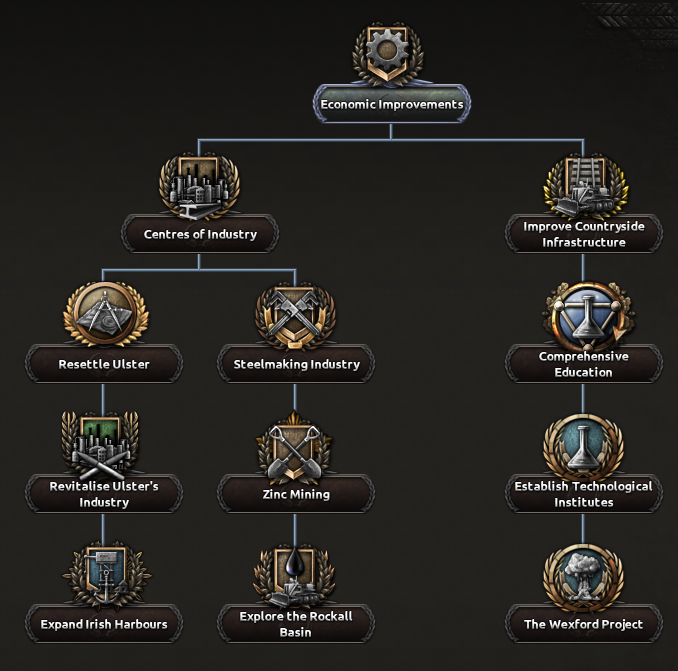
The main body of Ireland's fascist government is the Comhairle Náisiúnta, functioning similarly to the Grand Council of Fascism in Italy. The current Ceannaire of Ireland is Gearóid Ó Cuinneagáin, who has ruled Ireland for the past 14 years, and who is a strong believer in promoting culture and focusing on soft power. To this end, he believes in the creation of modern architecture, in many cases to replace old British-constructed buildings and building up Dublin, along with promoting cultural pursuits such as sports, art and literature, as well as forming youth groups to instill the youth with patriotism and loyalty. If he does begin to make mistakes though in his dealings with the INLA or foreign policy with the decline of Germany, he can be replaced by other candidates, such as Oliver J. Flanagan, a National Socialist who wishes to implement social credit policies in Ireland and decentralise the nation to appeal to the other provinces of Ireland who have long felt neglected by the government's focus on Leinster and particularly Dublin, or Seán South, the Chief of Staff of the Irish Republican Army, a devout Catholic who a rapprochement with the Church and to step away from 'atheistic' fascism in favour of a state firmly based on Catholic social teaching.
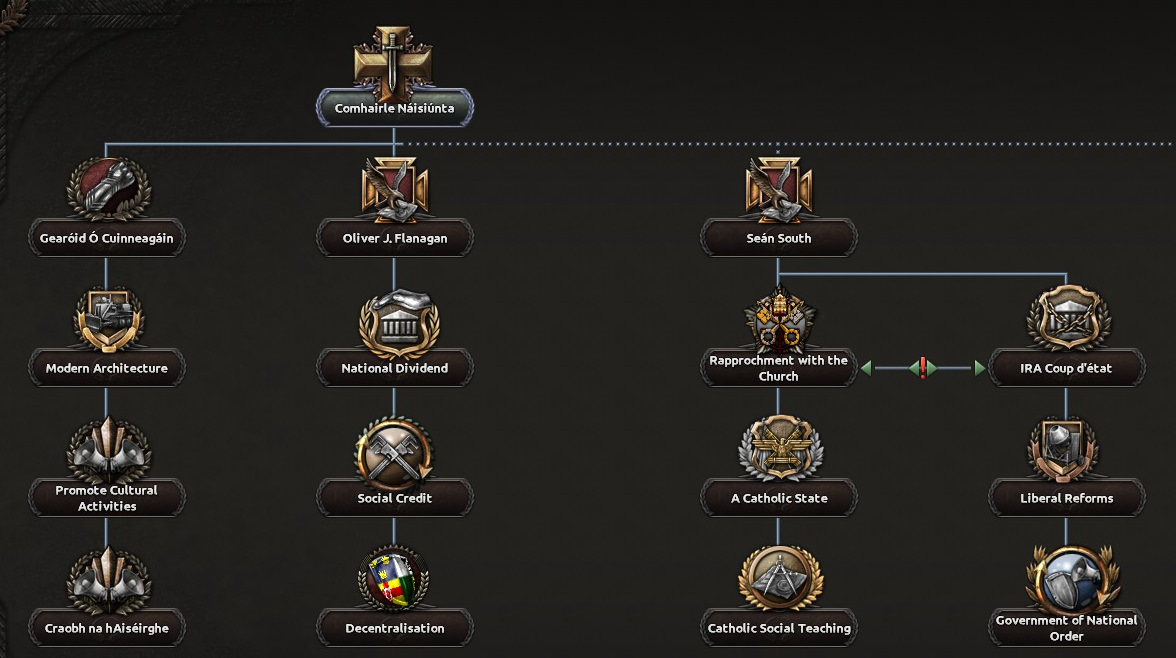
If things get out of hand, South is also willing to use the military to restore order whether that means ruling Ireland as a military dictator or turning over Ireland to the Irish government-in-exile.
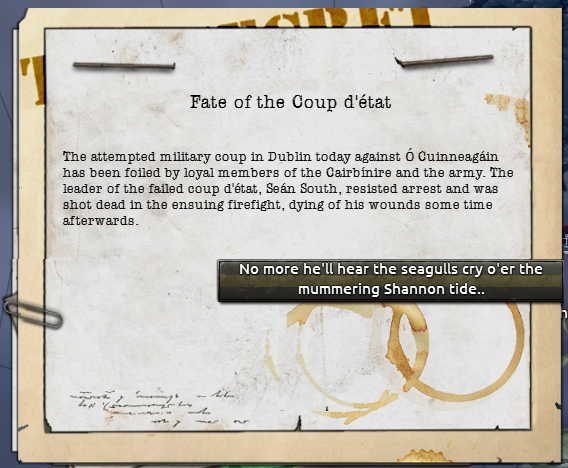
Speaking of that; the fascist regime is not invincible, opposed by the Irish government-in-exile resides in Scotland, formed by a group of Fianna Fáil, Fine Gael and Labour party members who fled Ireland after the 1948 Revolution and once again united under the banner of Sinn Féin. Should they managed to restore democracy in Ireland however the political differences between the former Fianna Fáil-Fine Gael right, who want a liberal economy and free state, and the left-leaning former Labour party, who want to secularise Ireland and improve the rights of workers, might end up splitting Sinn Féin once again. Also opposing the Irish government is the Irish National Liberation Army, a socialist paramilitary group fighting a guerrilla war against Ó Cuinneagáin's regime, should they succeed in overthrowing Ó Cuinneagáin they can choose to either embrace communism or democratic socialism.
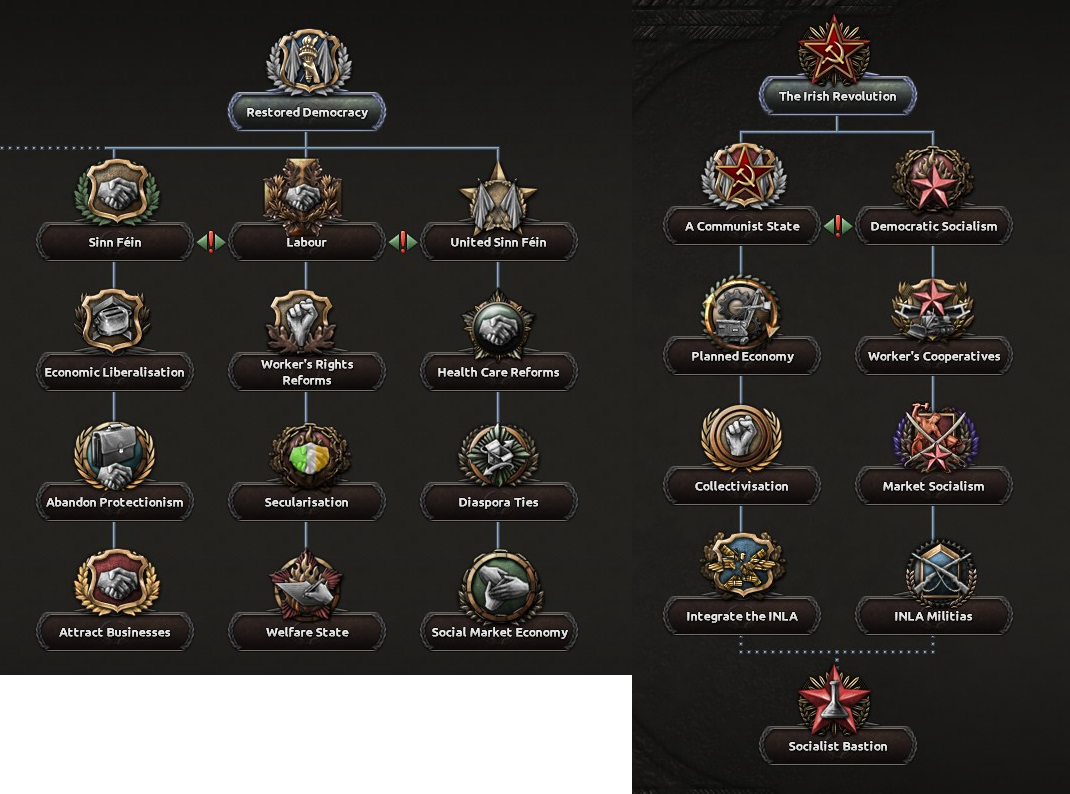
The guerrilla war against the INLA is a dangerous matter in which the Irish government must be careful if they are not to be overthrown by a revolution or military coup, especially if fascism and German power should begin to wane. To the situation, there are two main approaches they can take, the path of compromise, or the path of crackdown and force.
Next is Ireland's foreign policy. With the decline in Germany and tensions in England, combined with a growth in the idea of Pan-Celtism throughout the Celtic Fringe, Ireland can take on being the leader of Pan-Celticism and attempt to unite the Celts to form a power in its own right, either through diplomacy or force, which may prove needed due to ideological differences. We will have more on the tree for a Celtic Union at a later date, so be sure to look forward to that.
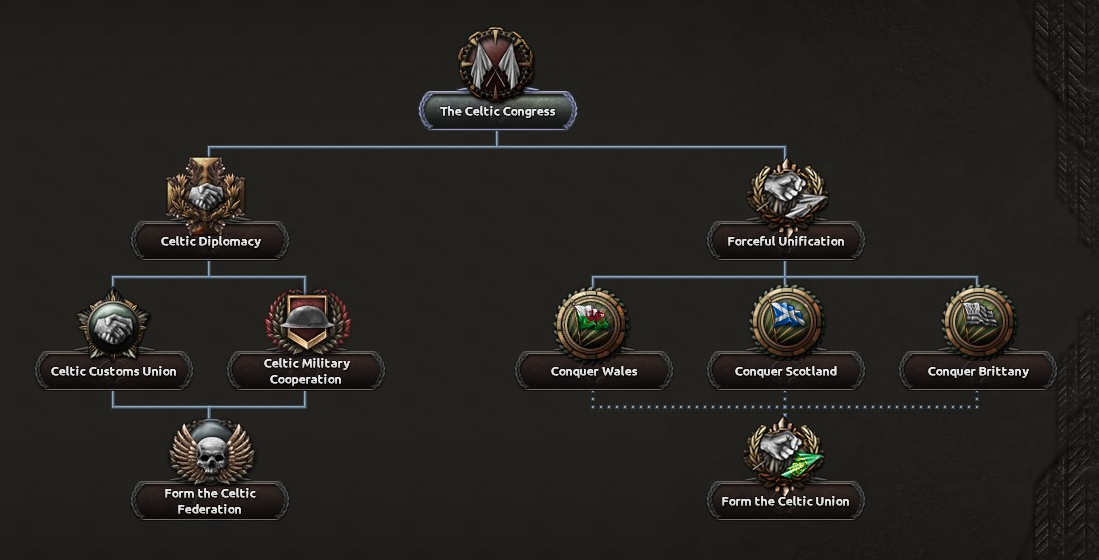
Finally, with German power declining, Ireland may need to begin to reconsider its choice of ally and protector, either choosing to remain with Germany as a steadfast ally in gratitude for its help against Britain in the past and further cement ties, or choose to leave the Unity Pakt giving the Irish the choice of going back into neutrality or aligning itself with the Triumvirate or America.
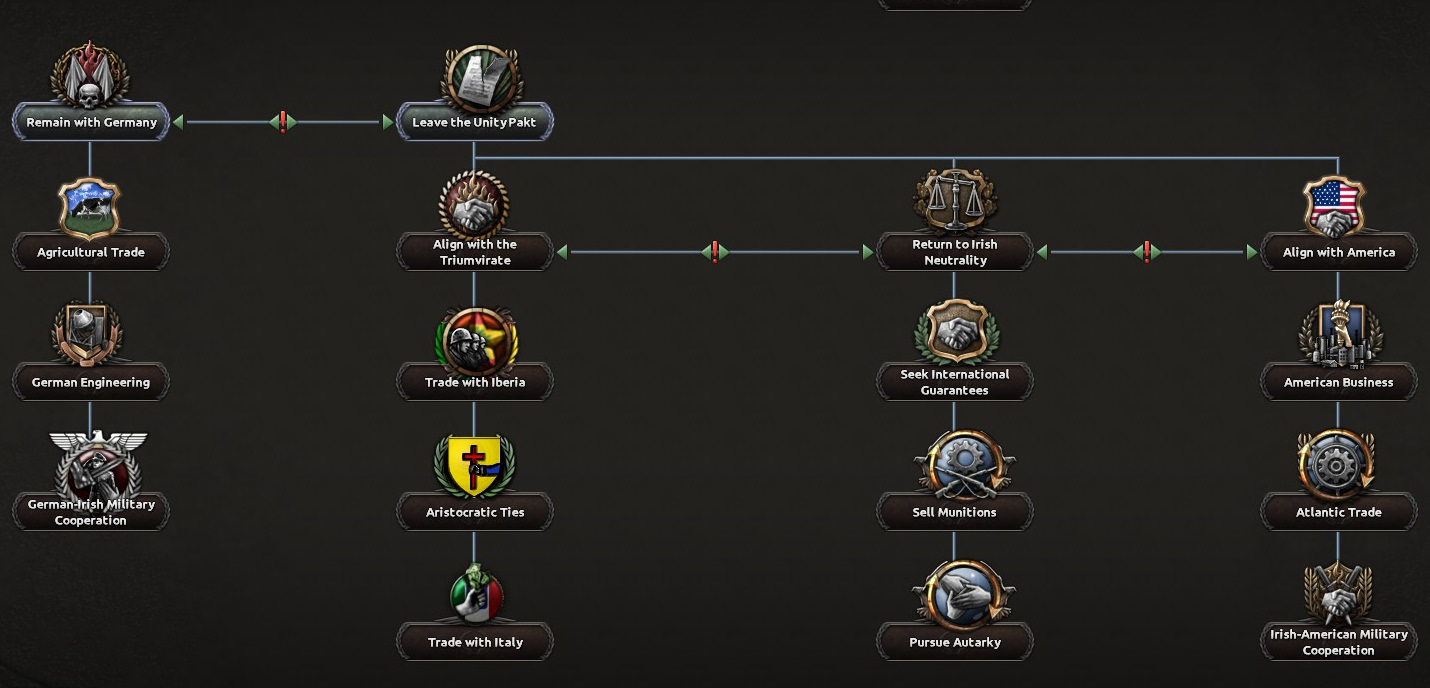
Scotland:
Hello, I am JakeR2000 and I am the Scotland developer. Let’s take a look at the lore for Scotland.
In 1945, after 3 years of invasions, the United Kingdom formally capitulated to the German Reich. Suddenly, after years of being under the British flag, Scotland found itself in a position to declare independence, with John MacCormick and his growing Scottish National Party declaring an independent Republic of Scotland with the capital at Edinburgh. The Germans, knowing the newly established Scotland and the leftovers of the British Army would fight to the last man, recognized Scotland’s independence.
On 21 May, 1947, the Constitution of Scotland was ratified, establishing full neutrality and naming MacCormick as the provisional President until elections could be arranged.
As of 1962, the rapidly aging MacCormick remains the Provisional President, not calling elections due to the possible threat to neutrality and the almost-definite destabilization in the nation. However, questions have begun to arise about his health, and about who will replace him.

Thanks to discoveries of oil in Scottish territory on the North Sea, the Scottish have remained relatively self-dependent since 1945. This oil, however, has secured the interest of the Germans, who since 1960 have been trying to peacefully secure a deal for the oil, not wishing to gain the anger of a majority of the world invading a neutral nation.
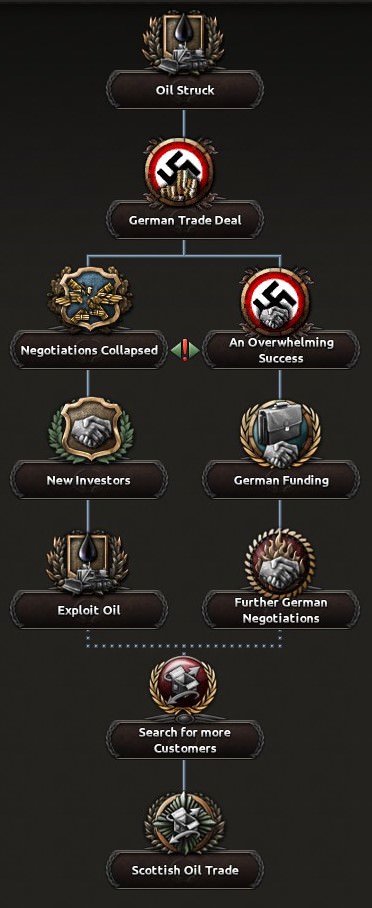
Situation in 1962:
Due to their neutrality, Scotland remains relatively safe despite the threat of worldwide nuclear war. The source of de-stability in the nation, rather, is the declining health of their nation’s founding and unifying figure, John MacCormick. They retain a moderate defence force, mostly made up of volunteers, with British soldiers from late in the war forming most of the officer corps.
Upon MacCormick’s death in late 1962, a battle between the four major political parties begins to secure the spot of President.
Scottish National Party (Market Liberals) - Established as a party endorsing Home Rule and independence from the United Kingdom, John MacCormick took control of the party in late 1941 and was a major opponent of the war. It has been the official ruling party since the nation’s independence in 1945, and is the most popular party in Scotland even without MacCormick.
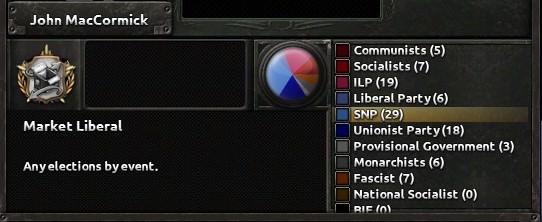
Independent Labour Party (Social Democrats) - A socialist party, mostly spanning form social democracy to near-communism. Founded and still led by James Callaghan and Barbara Castle, who, while not natives, moved to Scotland as it was their only escape from Fascism. It is the second most popular party in Scotland, and Callaghan and Castle’s conflicting ideologies are sure to lead to eventual conflict.
Unionist Party (Social Conservative) - This party is all across the board. Most factions within the party advise some form of British nationalism, spanning from establishing a British Republic to inviting Queen Elizabeth II back to her rightful throne. Led by Scottish-descended British exile Harold Macmillan. It is the third most popular party in Scotland, mostly being sponsored by exiled British officers and soldiers.
British National Movement (National Socialist/Fascist) - A banned movement in Scotland that has a small underground following. It emphasizes establishing a union with the German puppet England as soon as possible, reestablishing the United Kingdom as a German puppet. Even when it was banned in 1953, it was not too popular, but some say that the Germans have been changing that.
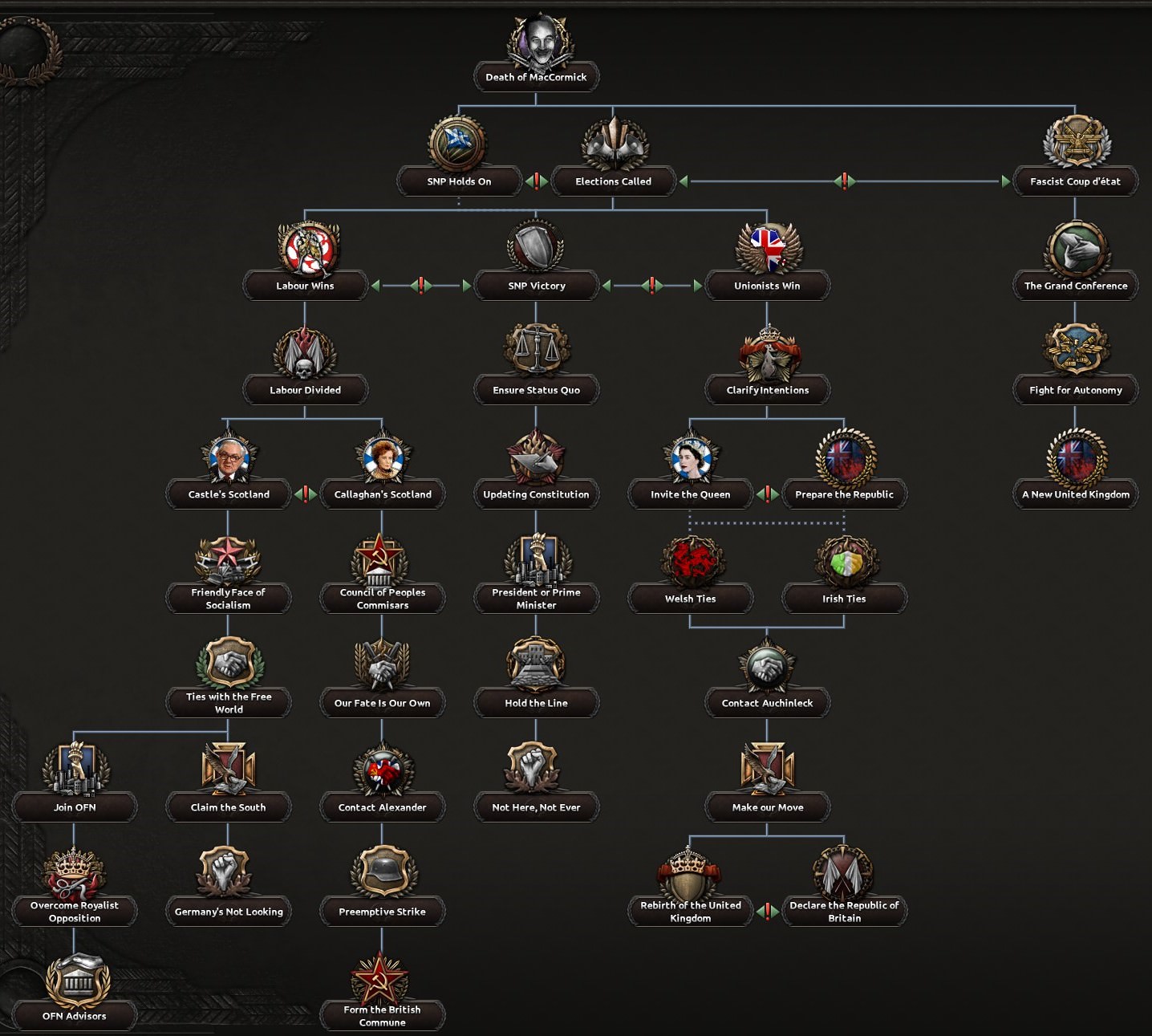
Wales:
Hey everyone, it’s Mr. Goldenfold, math teacher and developer for Wales, and mop, Goldenfold’s helper on the Wales tree. Let’s catch up on the lore.
In 1962, Wales is a fully independent nation, however it’s economy is completely controlled by Germany and allows the German military to hunt down rebels that have spilled over from neighboring England. Wales is now at a crossroads, however. Earlier that year, it was exposed anonymously that the Welsh government was outsourcings thousands of tons of coal to Germany for low gouged prices. A majority of Welsh miners, members of the syndicalist-leaning “Wales Miners' Federation”, are now striking and demanding change from the government. The leading party, Plaid Cymru, has been the umbrella party of the independent Wales for quite some time, not taking much decisive action and just compromising.
Their leader, Saunders Lewis, grows old and is weary of politics. Most of the time, he retreats to the Welsh countryside to write poetry. Add this with a growing youth counter-culture for Wales, and the nation is truly stuck.
The German ambassador to Wales, Wilhelm Bohle, is a machiavellian puppetmaster. Operating out of his mysterious headquarters in Cardiff, he influences various politicians to act in favor of the German Reich. Welsh ultranationalists and other small politicians have attempted to call him out, all to failure. Lewis is aware of Bohle’s influence, but is helpless due to his political inexperience and need for German economic aid.
The player must decide between several choices. Should we just empower Bohle and his puppets, making a more efficient Wales? Should we restore faith in Lewis? Should we compromise with miners on something? Or perhaps, a more radical path. Wales might seem tiny on the outskirts, but its quickly become a hotbed for new political thought, as young men leave England to escape German hegemony/media influence.
So onto the tree:
Hey, I’m mop, I helped create the Welsh tree, which we’ll look at right now. First, we’ll look at the political sections, the largest section of the tree. The future of Wales essentially hinges on the actions that you take in response to the strikes.
[BREAK STRIKES PATH]
The first action you can take is to simply break the strikes- deploying riot police, arresting strike leaders, etc.. This is Wales’ status quo option- in this section of the tree, you can keep Lewis while remaining in good relations with the German Reich. However, down the road, the Plaid Cymru party splits into two separate parties- a nationalist party and a social democratic party. It is up to you whether you choose a future of Welsh freedom and eventually join the American bloc, or choose Welsh nationalism and make an informal ascension into the German Unity-Pakt. Or you attempt to play your cards and stay completely neutral in the Cold War.
[NEGOTIATE PATH]
This next path is about finding a middle ground with the strikers. This is the moderate way to distance yourself from the Reich- although you must make moves to calm down the strikes, how you deal with breaking away from the Reich is completely up to you. You could limit coal exports to Berlin, or restrict it completely. You can replace Bohle with a more loyal Welsh provisional supervisor, or get rid of the position altogether. You can compromise with Germany for the removal of their Garrisons, or throw them out of the country by force. The more forceful your options, the greater the risk of angering the Germans, however. From there on, you can get rid of Lewis and call a snap election, allowing you to elect the conservative Welsh Christian Party, Plaid Cymru (under new leadership), the Liberal Economic Party of Wales, or the Unionist party who retains nostalgia from their British path. The first two let you join the Celtic Union if it exists, while the last two let you join the Alliance of Free Nations. Meanwhile, the Unionist party also lets you invite the Queen herself, restore the crown, and attempt to take back the British Islands for Queen and Country!
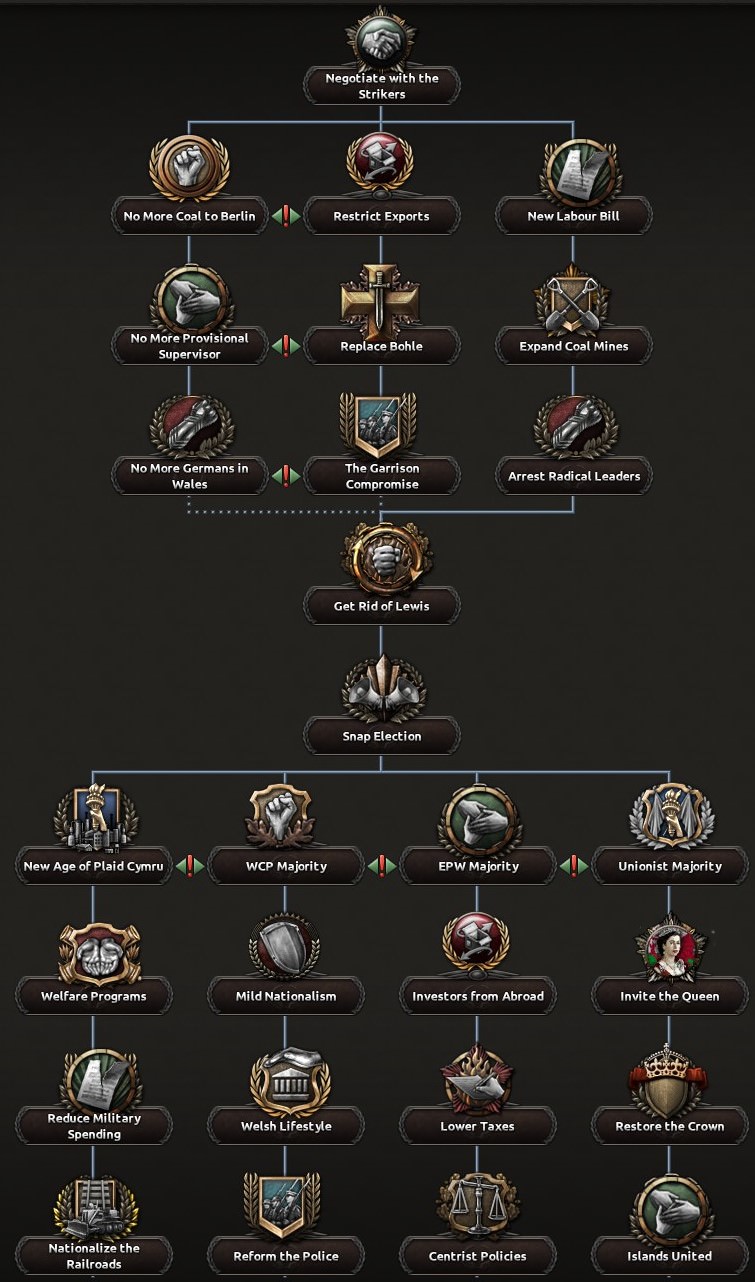
[NAZI PATH]
This path is all about Bohle’s tricks and bringing Wales closer to the Reich. Bohle is a very smart politician and pulls many strings behind the scenes. In this path, Bohle could ensure the victory of the Reich’s preferred party, the National Welsh Coalition. Led by Raymond Davies Hughes, this party will see Wales become a German lapdog, eventually joining the Unity-Pakt.
[THE NATION BROKEN PATH]
...But what if the strikers win? Although the strikers are mostly syndicalist trade unionists, anti-German militias belonging to the ultranationalist Free Welsh Army roam the countryside. These militias are known for their brutality, hanging Germans from trees. These two ideological enemies have a common enemy, however, and have formed a unholy alliance of sort to topple the corrupt Welsh government and remove German influence from the country. They will seek support from all forms- the Triumvirate, the Alliance of Free Nations, or the British rebels in their neighboring state. However, after toppling the government, you will find yourself in a problem- both the Syndicalists and the Ultranationalists want control over the country, and a power struggle will ensue. If the Syndicalists win this power struggle, they will have a chance to export the revolution to the rest of the British Isles and create a new bloc in this Cold War for the defense of the revolution in the Isles. If the Ultranationalists win this power struggle, they will have a chance to strike the Cornish and the British in an attempt to create their own Lebensraum- the Gofodbyw- and declare a Greater Brythonic State!
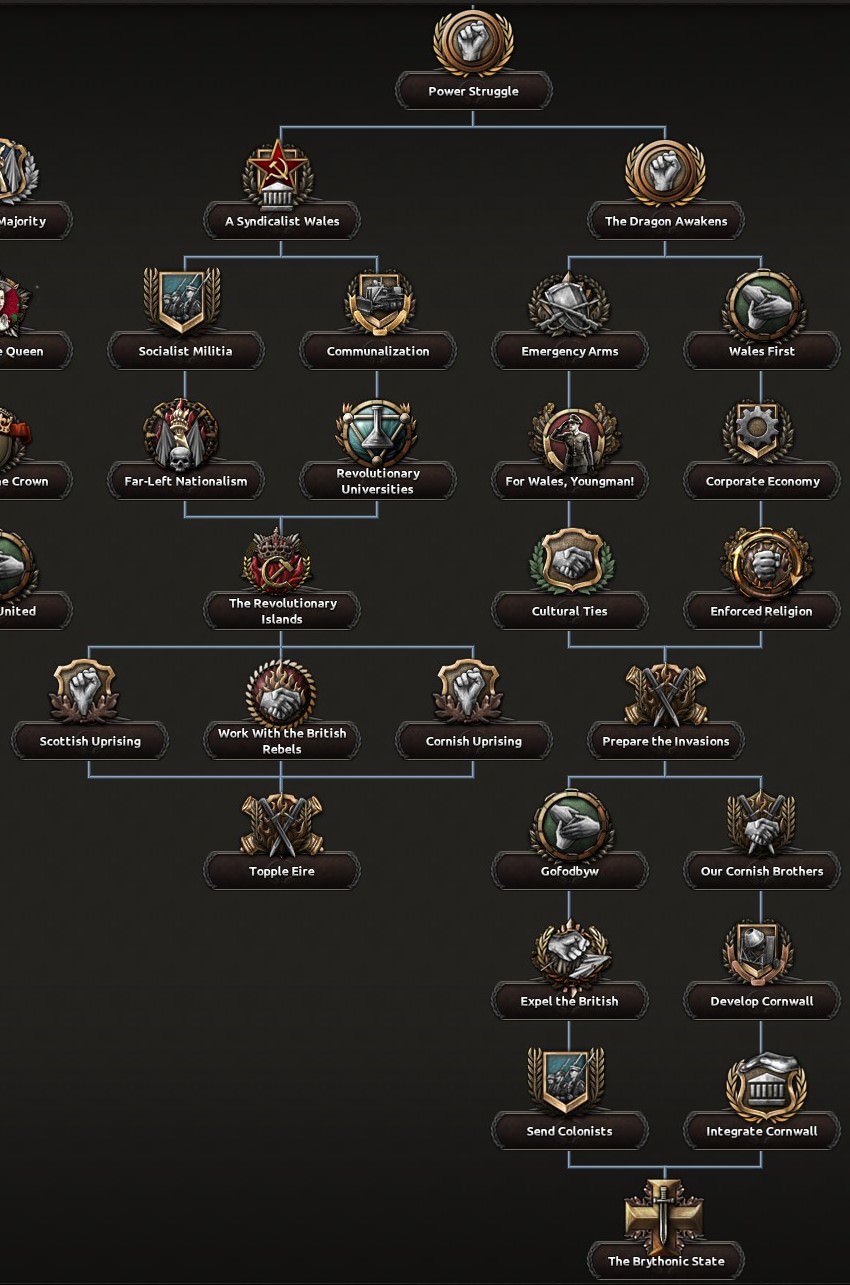
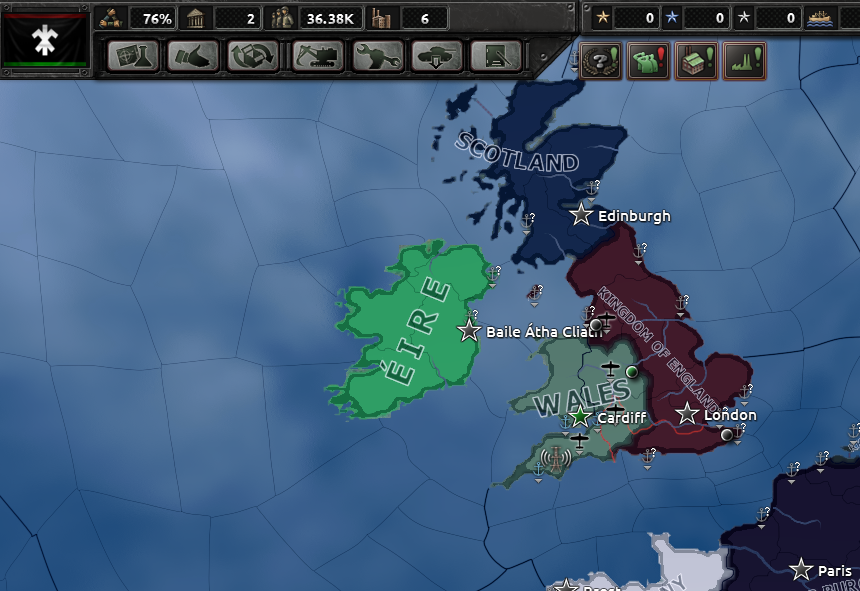
[INDUSTRY, ARMY, AND NAVY]
These three trees are pretty simple. The industry tree is all about building an industry in a small country like Wales. The navy tree is centered on maximizing the capabilities of Wales’ small navy, eventually being able to obtain the HMS Vanguard from Britain. The army tree is focused on modernising the Welsh army and maximizing it’s potential.
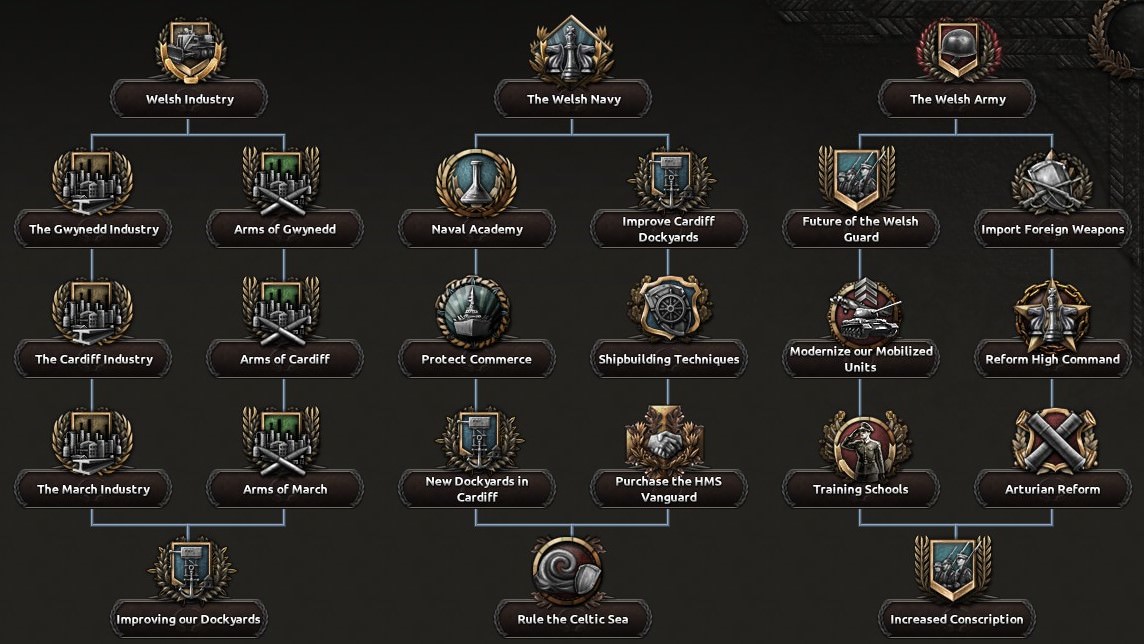
Panzer note: The Welsh tree is still WIP! The military sections especially will receive some expansion, but we felt that what we have here was good enough to show you all in the diary.
The Cornwall Governorate:
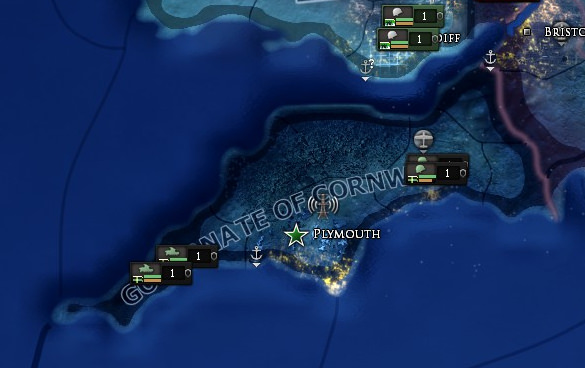
Honor. Strength. Loyalty to the Fatherland. These are the core tenets of the Cornwall Garrison. While seemingly the smallest of the Reich’s many frontiers and the least important of them, the Garrison, thanks to Halder’s influence and a strong propaganda campaign, maintains a reputation as possibly the most prestigious and honorable posts in the Reich.
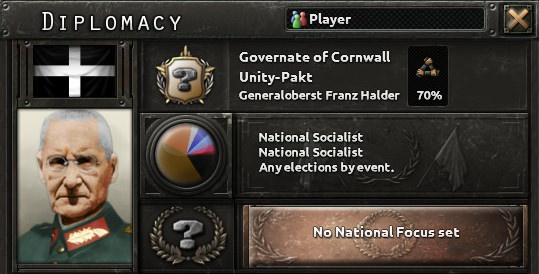
Halder, from his headquarters in Truro, rules the entire German Garrison in England. While initially relatively subdued and giving a fairly lax hand to the British, a string of failed revolts in the 50s caused the Garrison to greatly escalate its efforts to contain any possible British resistance movement. The Garrison maintains posts all throughout England, and treaties with Scotland and Wales force them to allow German soldiers to regularly enter in order to purge them of resistance fighters.
While they are the stars of the Reich, seeing themselves as the first and last line of defense of the Reich against its enemies in the west, that doesn’t mean they are equipped for this post. With the Reich ailing and on the verge of utter collapse, again, the supply shipments have slowed, and the byzantine layers of restrictions and red tape on the Garrison and its relations with the rest of the isles means the Garrison has quickly found itself unable to do anything but inspire the British towards further unrest.
Technically a part of England still, just under German martial law, Cornwall can not even claim its own industry sector, and has no real navy or air force to speak of. Treaty restrictions mean it is unable to change this without the slowly turning wheels of German bureaucracy allowing for it. Meaning that in its current state, the Garrison is effectively frozen.
Of course, like all things, this shall change. While built to simply be a place for German soldiers to hold the line as a beachhead until reinforcements can arrive, in the situation of an English uprising, the Reich is fading, and the Garrison must find new ways to protect their homeland. Whether the Reich supports this or not does not matter, this is not a time for the politicians and diplomats, the tides of war are crashing on the shores of England, it is time for action!
The Cornwall tree is split into two opposing sections, representing a massive decision for the Garrison. Will they stay with Germany, against it all, or will they be forced to find new avenues of support? The Garrison will not seek independence, but they will have to decide whether they will find ways to improve their situation within the confines of the Fatherland’s wishes, or whether they must choose to betray the Reich, in order to protect it.
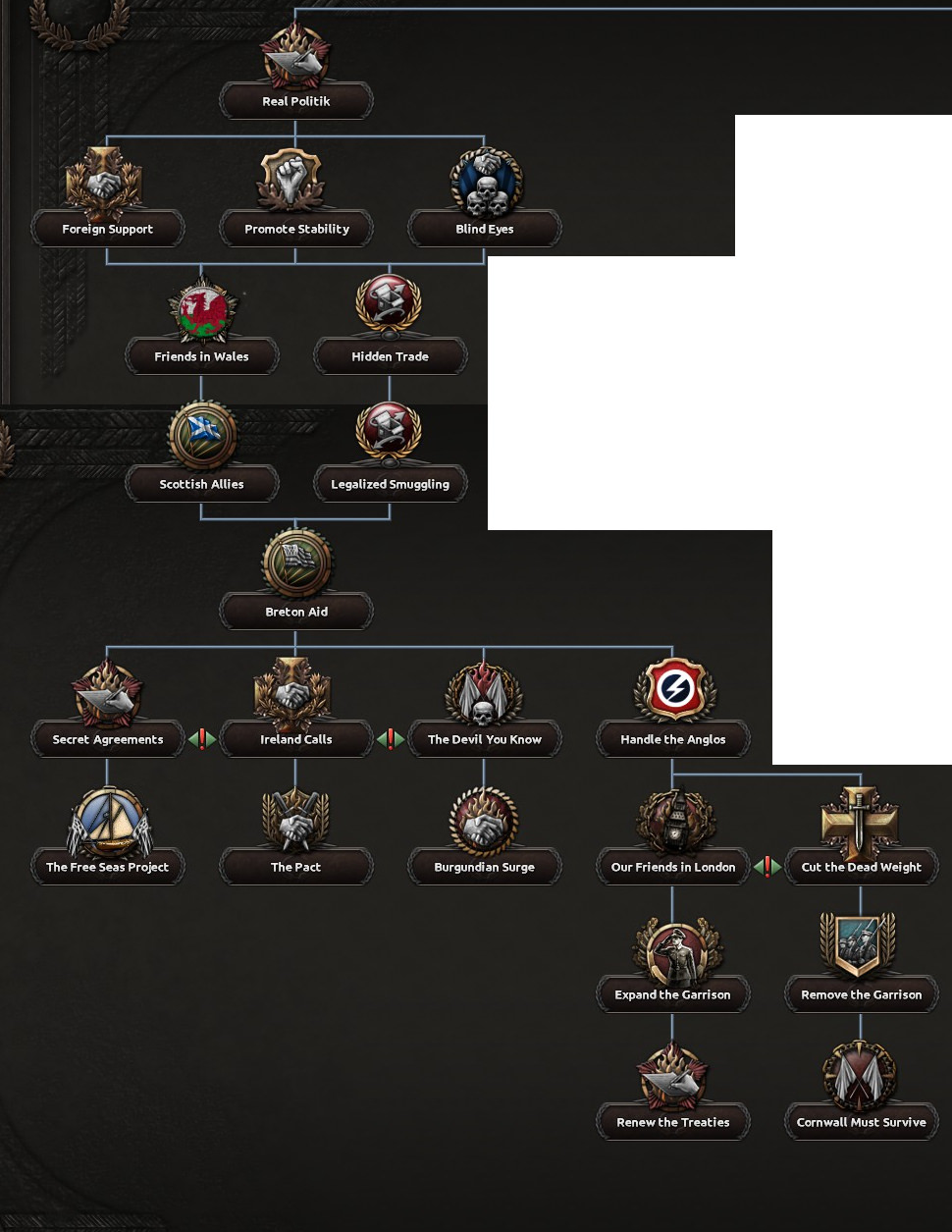
We will start with the decision to stand alone, and with its leftmost focus, “Real Politik”. Cornwall must find new benefactors if it's going to maintain its existence and if the Garrison has any hope of survival. Without men, money, or supplies coming from the Fatherland, new support must be found. First, the Garrison will need to look at the other nations of the Isles. While Ireland, Wales and Scotland all have their own views on Germany and England, none can disagree with a good trade deal, and the Garrison can attempt to establish new routes of supplies through them.
There is also another thing the Garrison must do for survival, even if it goes against their virtues. Smuggling and illegal trading, unmarked cargo and packages to turn Cornwall into a black market state. With an economy effectively being pieced together from scratch at the last minute, there is no time to establish official deals everywhere, but plenty of shady figures require a port to call home.
At the end of this section, the Garrison must decide who exactly to join as its new benefactor, if anyone. The United States can agree to assist the Cornish Garrison, under the table, with enough effort from the Cornish and some luck, as well as agreement to assist in keeping American trade to Europe free and open (against the wishes of Germany). They can side fully with Ireland and help create or join their Celtic Union as an ally, or take the third option, and as always, the riskiest and possibly horrifying, and make contacts with Burgundy and attempt to arrange accord with Himmler. What could go wrong there?
Finally, there is the questions of the English. Will the Garrison continue its position as the brave protectors of England, and attempt to draw closer for the benefit of both, or will they cut the ties and focus entirely on their own survival?
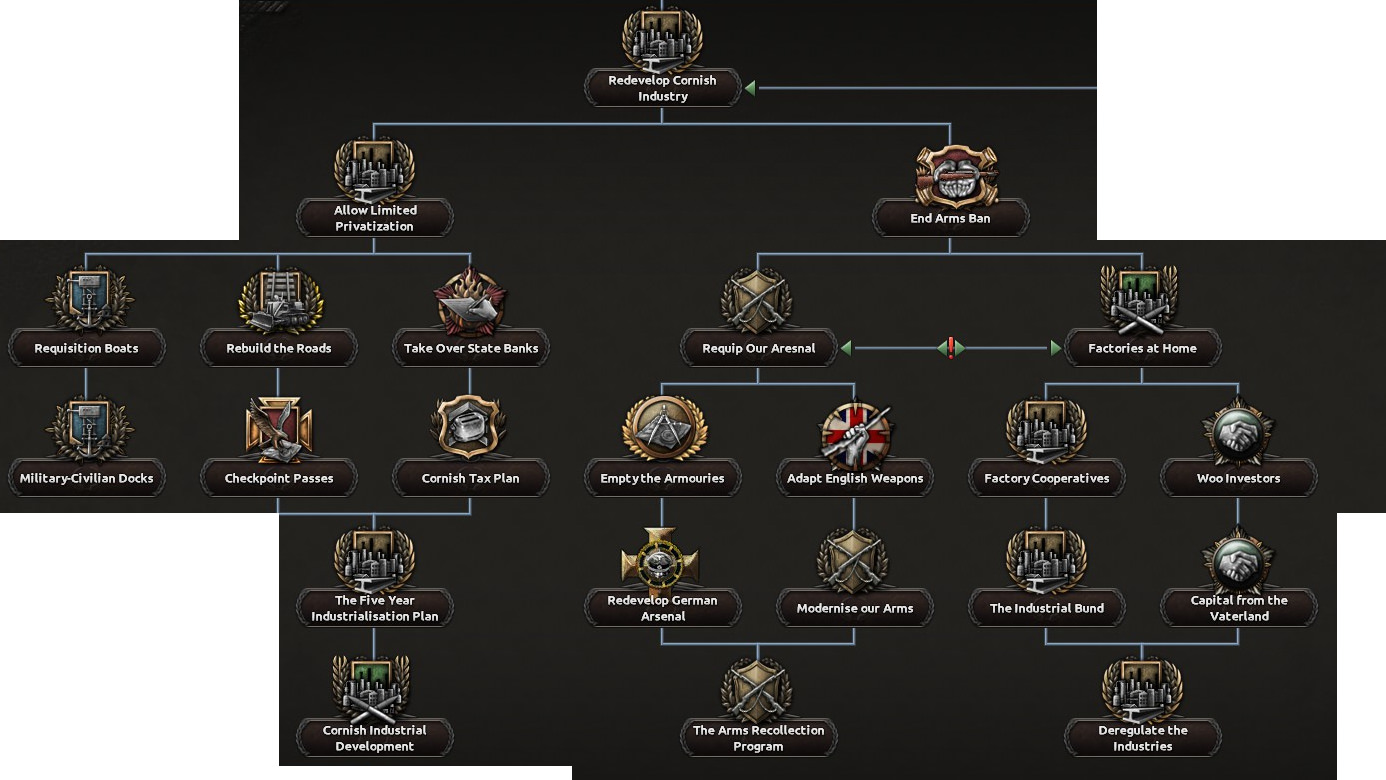
The Cornish industry must also be rebuilt and revitalized. The left side of this tree involves the building of civilian industry by restoring movement throughout the area, easing some of the harsher aspects of the martial law, and attempt to turn Cornwall’s industry to entirely new levels in preparation for the coming storm.
On the other side, there is a decision to make. Will Cornwall focus on the modernization and expansion of its currently limited arsenal, leading to quickly and rapidly building up a large amount of arms and weapons, at the expense of their quality and by being forced to make use of English arms, or will they focus on building the military industrial sector, which can lead to stronger, uniquely Cornish weapon designs, but at the risk of being much slower and yielding far fewer arms?
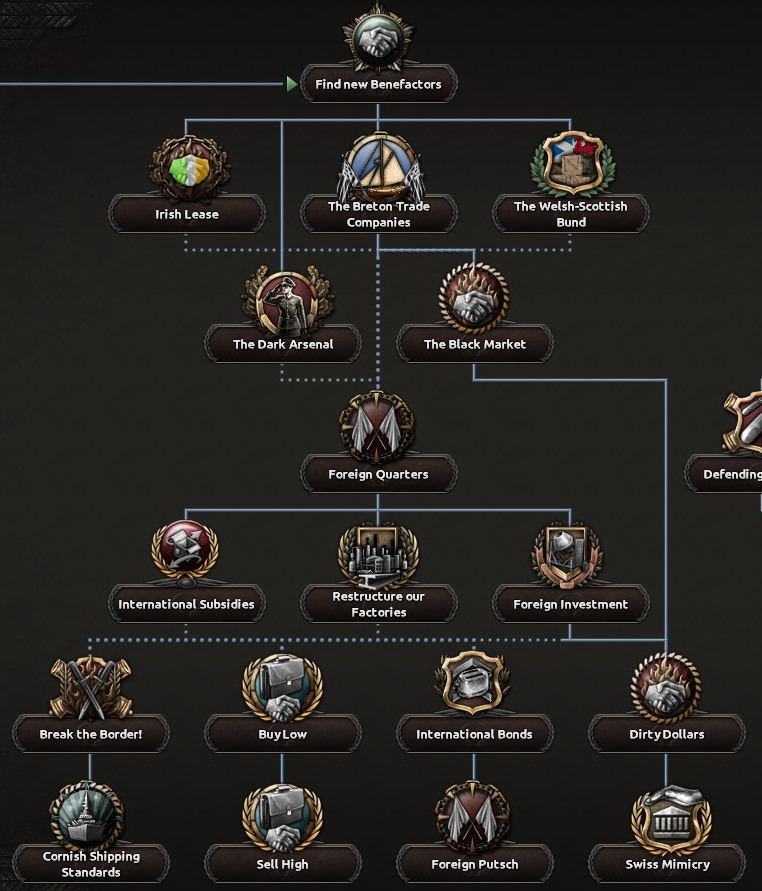
Instead of all this, however, the Garrison can focus entirely on trade focusing on trading with its allies (or using these as inroads to make them, in the political tree), and any other nations it can, and further exploiting Cornwall as a deregulated trade center? Even allowing it to go the way of Switzerland, and attempting to begin private, deregulated banks for even the most shady characters to find investments in.
You may have noticed that some of these focuses seem like… bad ideas. And they are. The Garrison is not trying to build a stable economy, it’s trying to pump out as much money and supplies as possible to keep it alive. The goal here is for Cornwall to survive, how it does so, of course, will have consequences. But surely the future won’t matter, when the present is so dire?
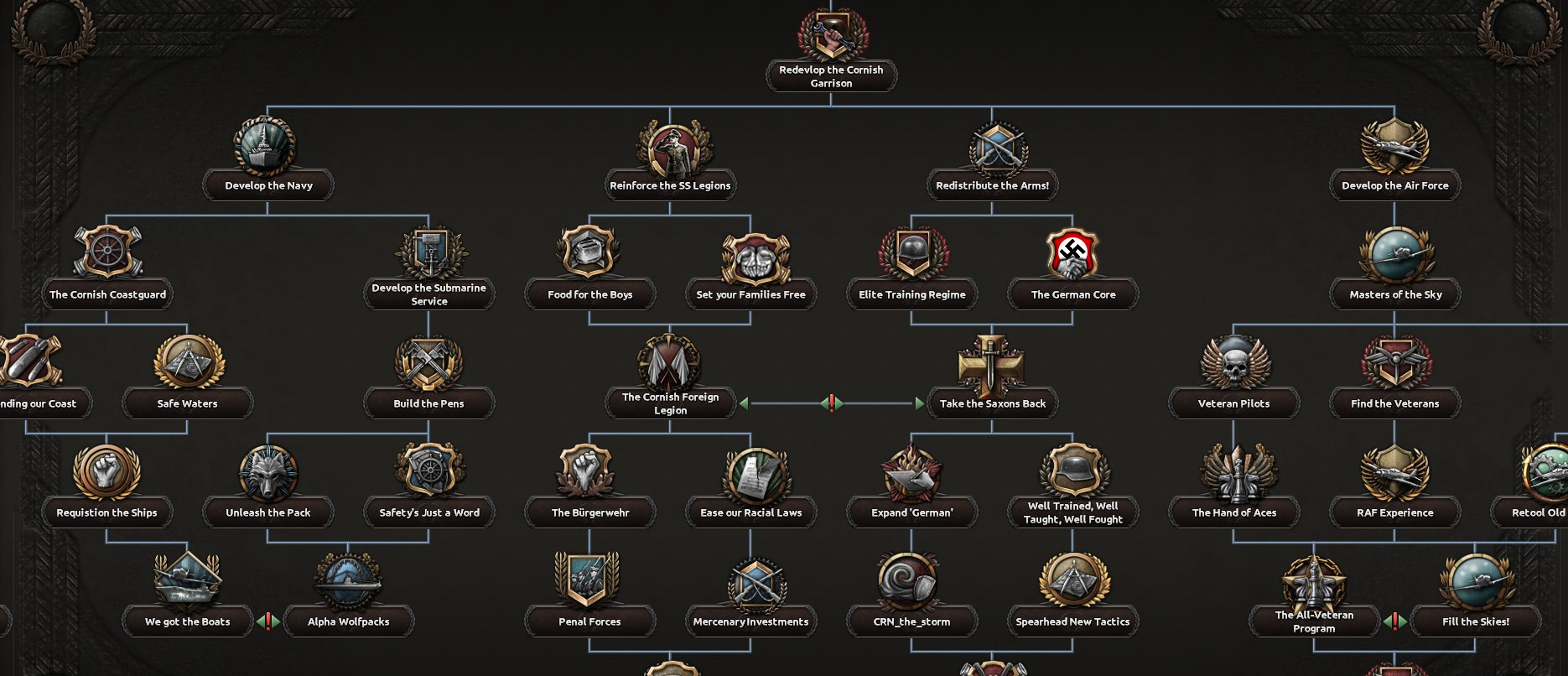
And then, of course, Cornwall must decide how it develops its military forces.
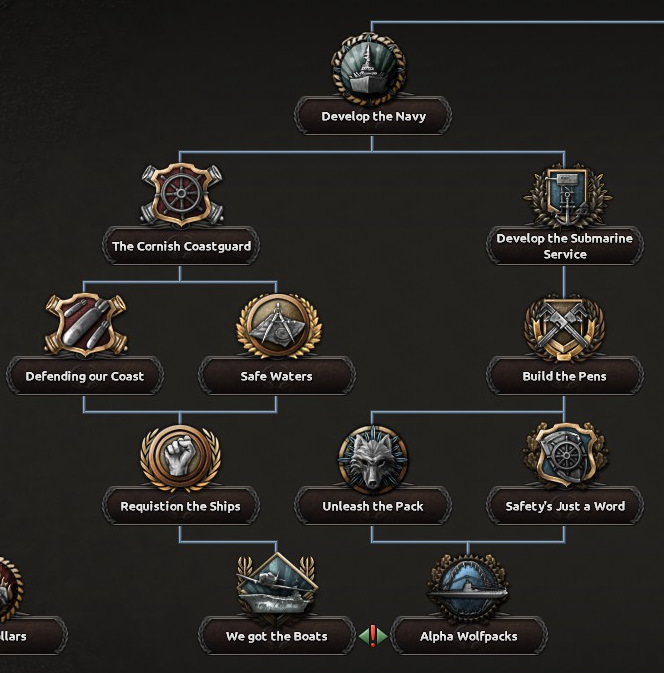
The navy must be built and its path decided. Cornwall has two main avenues to a stronger navy, a strong coastguard able to protect the Cornish shores and ensure the Garrison maintains its supply lines and trade routes, and a submarine fleet able to blockade the British isles and ensure no rebellion goes unpunished. This culminates in the decision to either bolster the Cornish navy through any means possible, so that the Garrison can build a large enough force to fend off any possible attacker, or focusing entirely on high quality submariners, hoping that the smaller number can be made up with great training and tactics.
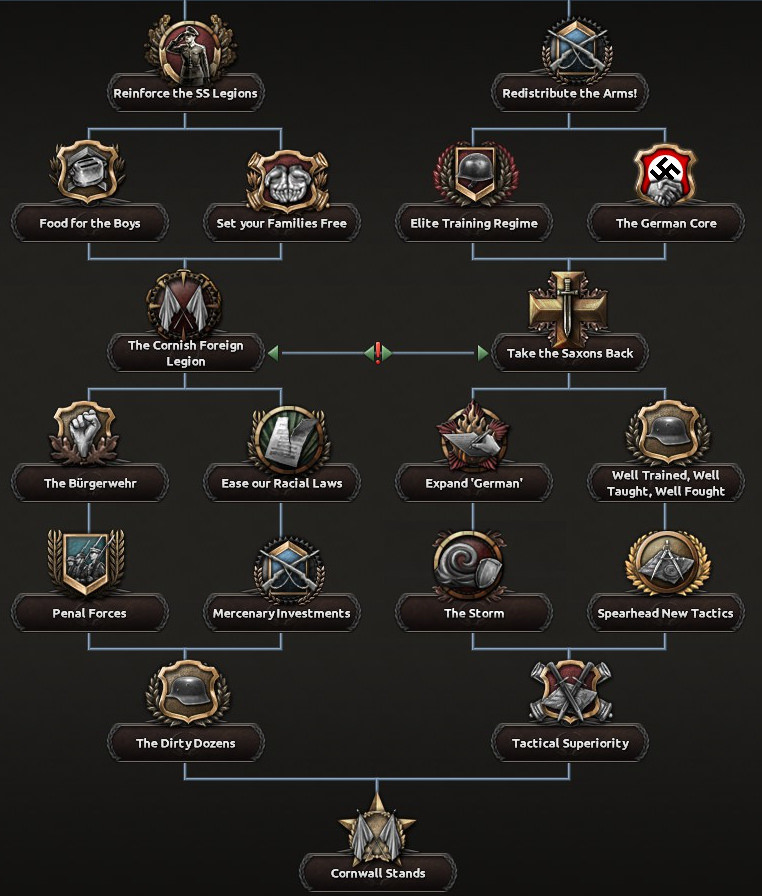
The Garrison itself will also need development, and two main opportunities present themselves. Either the Garrison can build up its, currently small, SS element, dragging in more Englishmen and locals to bolster their numbers, even if of poor quality, or will they focus on their elite German core to save their souls.
Some actions can be done in both, but only to a certain extent before one or the other must be focused on. If the SS path is continued, Cornwall will build up not only their local SS regiments, but begin a foreign legion and a people’s army and begin welcoming in mercenaries, criminals, those considered ‘degenerate’ by the Nazi regime, the old and young, prisoners, women, and anyone else able to hold a gun. Culminating in large numbers of soldiers of dubious quality at best, working for a paycheck the Garrison is leaving blank to welcome these masses.
Or will the Garrison continue forward with its elite core, and focus on making the Garrison one of the most elite, but small, military forces in the world? Spearheading new, dangerous and experimental tactics that most militaries scoff at adapting and focusing on lightning, furious warfare.
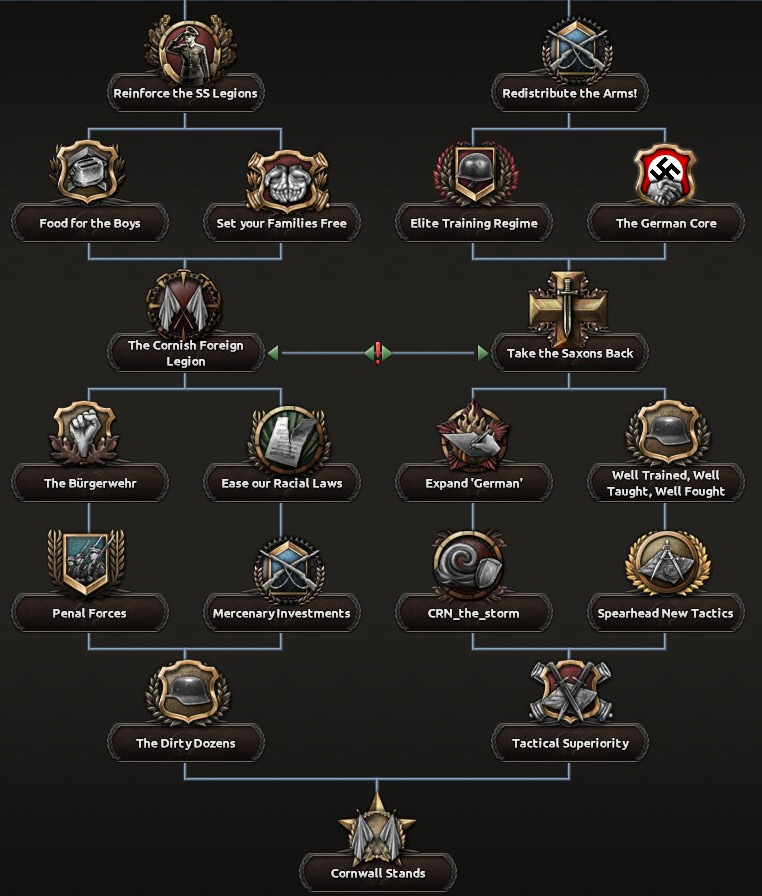
Finally, as Cornwall will have no real air force to defend itself without support from Germany, it will need to focus on developing an actual fighter fleet to keep the skies clear. Cornwall will need to either focus on uplifting those Germans who know what they’re doing to become an elite force of pilots willing to do anything for the protection of the Fatherland, or find the veterans of the RAF and try and woo them into assisting the Garrison through any ways possible, while also building up the bases and inventory needed to actually do so. The decision will then be made, will Cornwall focus on a larger air fleet, or one of well trained fliers, focusing on experience, aces, and superior training?
This ends the “Stand Alone” portion of the tree, and now we are onto the second. The Garrison must not fight simply for survival, it must maintain its vows to protect the Fatherland, no matter what difficulties that will bring. It can not flinch or falter, and it can not be rebellious and ruin the image it has built in the homeland.
The Garrison are the Fatherlands silent protectors, and they will stand vigilant.
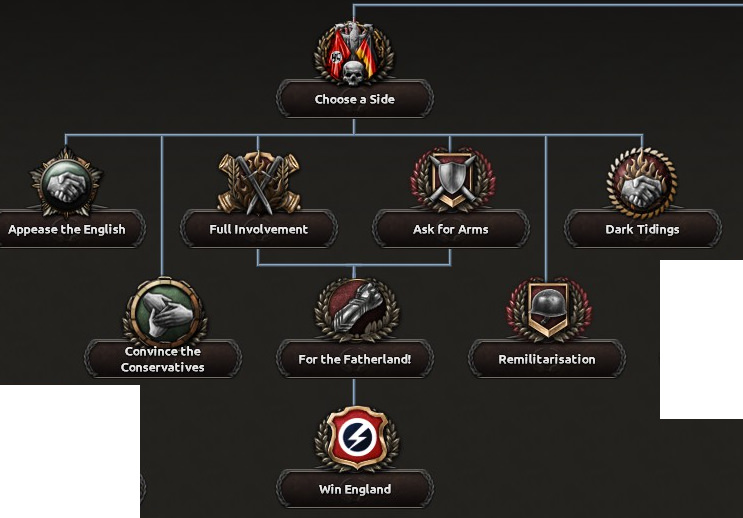
I will leave this side relatively unexplained for now, as it will make a lot more sense when the Germany diary comes. The various successors for the Reich are deeply entrenched, and many smell conflict brewing. Who, if anyone, will the Garrison side with? If they are able to ally with one, and they are victorious, no doubt the Garrison will see a new wave of support, possibly more than before the collapse.

And then there are pressing matters, such as industry and the economy. Cornwall needs money fast, and must focus on either the the corporations and industries of the Fatherland or on the citizenry themselves. Through strong propaganda and private investments, the Garrison can encourage the German people to funnel money and support through, or they can work towards wooing German industry to help greatly build up Cornwall, convincing them that stability in Cornwall is, well, just good business.
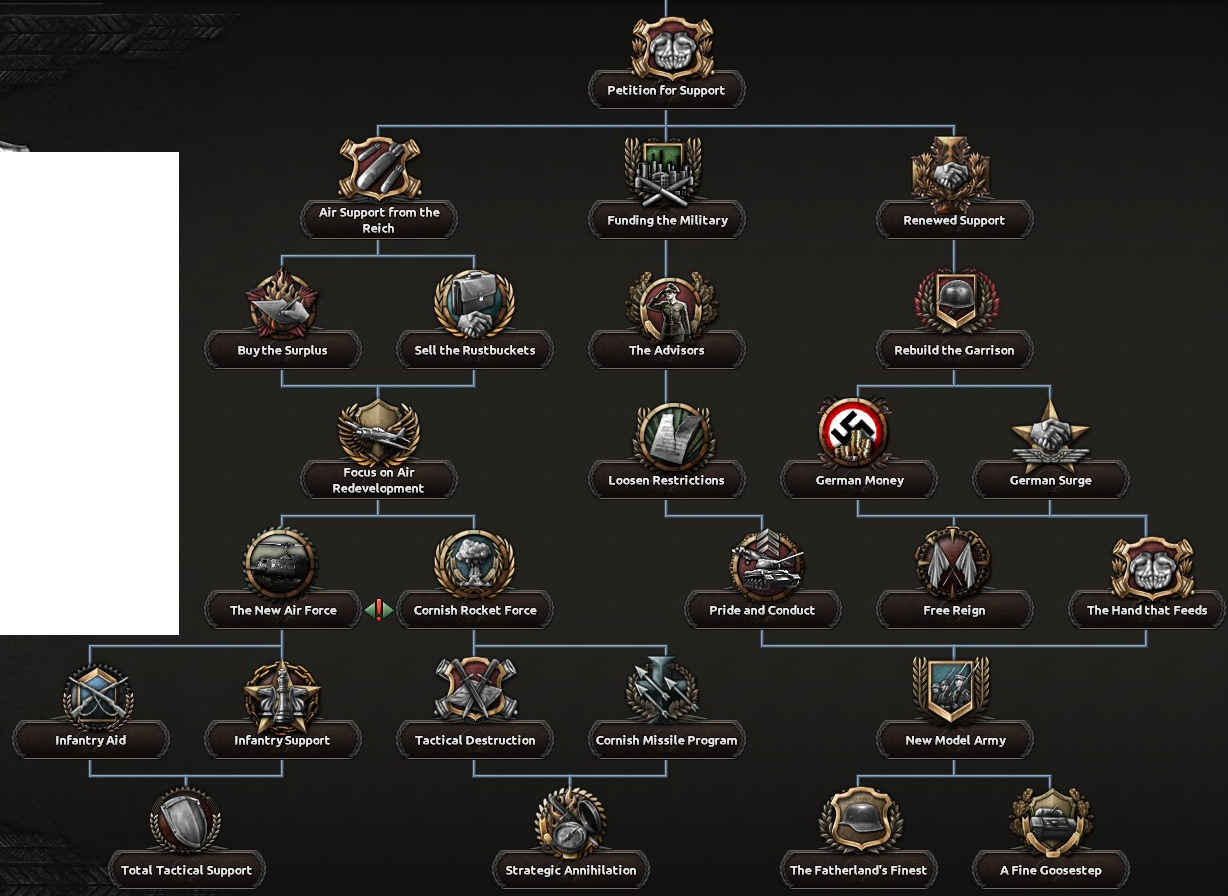
The military tree on the loyalty side is based around dragging out whatever support you still can from the Reich. On the left side, the air force will be rebuilt, through buying whatever can be bought from the Luftwaffe and getting assistance from the Reich to either develop the newest and most interesting developments in the air sector: Helicopters. Since the Reich can be somewhat trusted to ensure the skies remain clear, the Garrison can focus on using helicopters to support the infantry forces and annihilate the enemy.
Of course they can double back onto the Reich’s oldest means of bombing the English, with a new rocketry program. Designed to ensure the Garrison can remotely destroy pockets of resistance without having to risk its small manpower, the Cornish missile program can be a serious force multiplier and ensure the Garrison can continue swinging well above its weight, but the decision will need to be made over which, specifically, to focus on.
On the army side, the focus will be in getting as many volunteers and reinforcements that the Reich is able and willing to provide, and attempting to loosen restrictions that have neutered the Garrison’s ability to readily fight the growing number of insurgents. Still with support of the Reich and with the propaganda campaign in full swing, the focus here is on ensuring the men are ready to fight to the last, and that the Garrison maintains enough soldiers to make this a daunting task for any enemy that dares strike at them.
This will lead to the Garrison being a dangerous force. Perhaps not as well trained or as massive as in the survival tree, they will nonetheless be extremely zealous in their defense, and the English resistance will most likely want to avoid fighting the Garrison until it has dealt with all other issues first, as they will find themselves bleeding for every inch of ground taken.
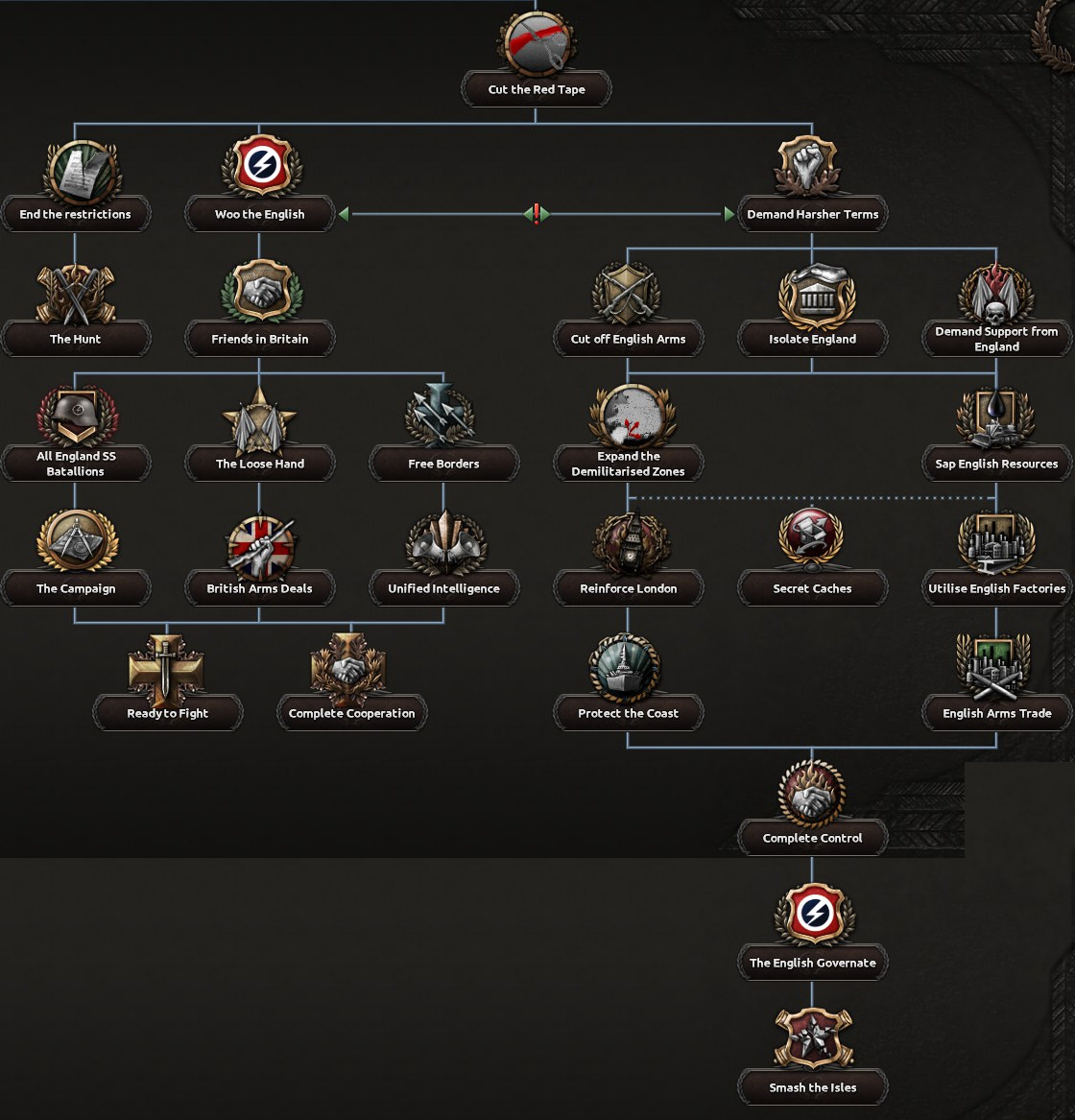
Finally, the Garrison must resolve the English issue. While restrictions can be laxed in the military tree, they can be utterly removed or redeveloped here. Through this portion of the tree, the Garrison will begin hunting for the resistance in full, causing serious issues for the HMMLR (that will be immediately felt by an English player) and, more importantly, deciding whether to save England by saving the regime, or by taking direct control from Truro.
On the left side of the tree, Cornwall will draw closer to the Collaborators and get the English government to assist in the running and functioning of Cornwall. Restrictions keeping the two apart will be pushed away to ensure the two can cooperate fully, leading to both armies being greatly improved and the HMMLR facing a dangerous, unified front.
Or, with much more risk, the Garrison can attempt to force the Collaborators to render them assistance. This will lead to the German Garrisons in England being reinforced and their English counterparts pushed aside, and will eventually lead to Halder petitioning, first, for the demilitarized zones to be expanded to further weaken the English government and ensure they will not be able to threaten Cornwall, and then for more land to be given to the Governorate for direct control. Leading, eventually, if the resistance is crushed, to the possibility of expansion into the rest of the Isles.
This may seem like a lucrative idea to a player, but doing so proves risky. The Collaborators may refuse these demands, leading to direct conflict between the Garrison and the English, which will greatly weaken them against the resistance and may prove to be their undoing. The HMMLR should be not overjoyed if the Garrison takes this path, however, as while it can lead to their biggest enemies killing each other, it can also lead to the superior troops of the Garrison greatly expanding and representing a massive threat to the resistance.
The AI is unlikely to choose this path, but it is possible, and should prove a very interesting game if they survive the rebellion. Of course, even if they smash the HMMLR, and the Collaborators, it’s doubtful that the already strained Garrison will be able to actually run and hold the entirety of England…
The English tree is a competition, and the Cornwall tree is affected by this. Much like the Collaborators, the Garrison must rush to be as ready as possible when the rebellion strikes. If some areas are ignored or poor choices made, the Garrison may find itself isolated, weak, and unprepared for the coming storm. And of course, the English will be working against you at every turn as well...
--
Thank you for reading another dev diary for The New Order! I would like to follow this with an announcement that may seem negative to many but I feel necessary for the team. We’ll be moving away from weekly dev diaries to weekly or bi-weekly content updates. We will be showing smaller things, such as new gameplay mechanics, art, and other such items we have on our pipeline instead of a weekly dev diary, as pumping out a diary every week is very labor heavy for our team and the lore devs themselves, and I worry about the long term sustainability of that plan.
We will still have dev diaries regularly, but they will be spaced out some more so that we have more time to develop them. Hopefully this will also mean the dev diaries will be more in depth with more to show, however, so I hope you all understand and still get as much enjoyment from the content updates.
As always, thanks to the team and the readers, and I can’t wait to see you next diary where we will be traveling to a European land still scarred by WW2, where the spirit of the fearsome horse rider has never truly died.
Thanks for reading! And remember, you can find us at our Discord, on Reddit, ModDB, the Paradox Forums, and Alternatehistory.com!
